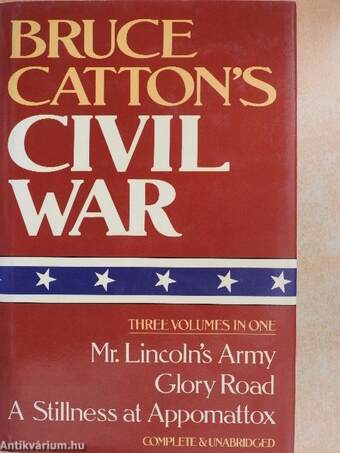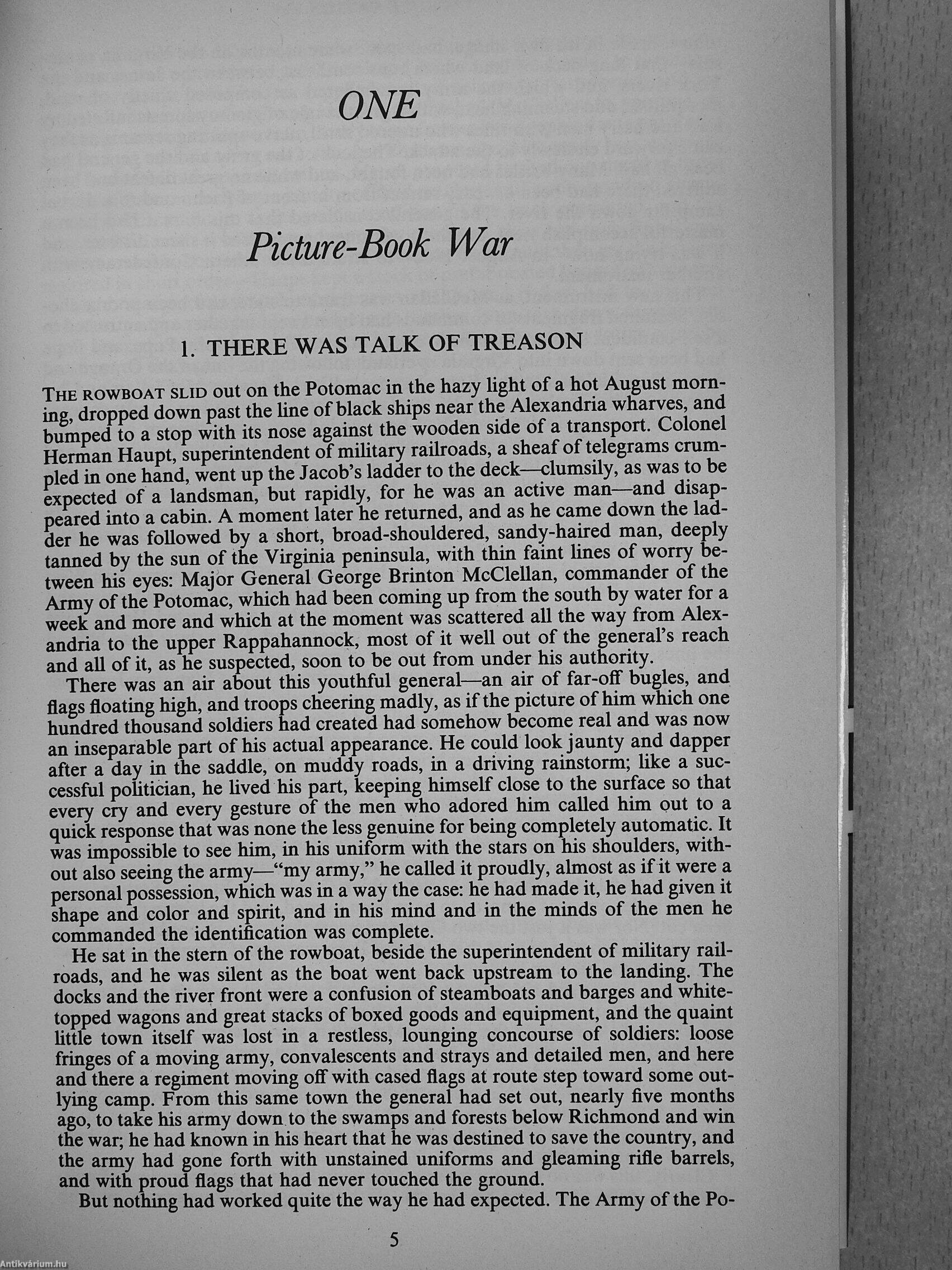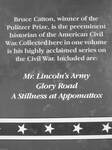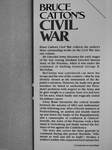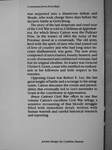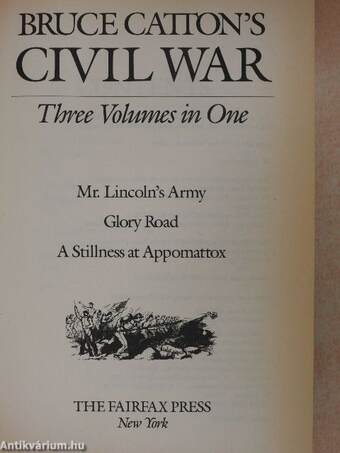1.069.689
kiadvánnyal nyújtjuk Magyarország legnagyobb antikvár könyv-kínálatát

VISSZA
A TETEJÉRE
JAVASLATOKÉszre-
vételek
Bruce Catton's Civil War
Three Volumes in One/Mr. Lincoln's Army/Glory Road/A Stillness at Appomattox
| Kiadó: | Tha Fairfax Press |
|---|---|
| Kiadás helye: | New York |
| Kiadás éve: | |
| Kötés típusa: | Fűzött keménykötés |
| Oldalszám: | 730 oldal |
| Sorozatcím: | |
| Kötetszám: | |
| Nyelv: | Angol |
| Méret: | 24 cm x 16 cm |
| ISBN: | 0-517-447711 |
| Megjegyzés: | Fekete-fehér térképekkel. |
naponta értesítjük a beérkező friss
kiadványokról
naponta értesítjük a beérkező friss
kiadványokról
Előszó
TovábbFülszöveg
Bruce Catton, winner of the Pulitzer Prize, is the preeminent historian of the American Givil War. Collected here in one volume is his highly acclaimed series on the Civil War. Included are:
Mr. Lincoln's Army Glory Road A Stillness at Appomattox
1
jf > jf 4
BRUCE CATTON'S
CIVIL WAR
Bruce Catton's Civil War collects the author's three outstanding works on the Civil War into one volume.
Mr Lincoln's Army discusses the early stages of the war, tracing Abraham Lincoln's famous Army of the Potomac, when it was under the command of dashing General George B. McClellan.
McClellan was convinced—as were his troops and the rest of the country—that he was divinely chosen as the instrument of the Republic's salvation. However, he made two great mistakes: He failed to understand the President's problems with respect to the Army, and he gave weight to a caution, born of a real love for his men, which finally and tragically ended his military career.
Glory Road chronicles the... Tovább
Fülszöveg
Bruce Catton, winner of the Pulitzer Prize, is the preeminent historian of the American Givil War. Collected here in one volume is his highly acclaimed series on the Civil War. Included are:
Mr. Lincoln's Army Glory Road A Stillness at Appomattox
1
jf > jf 4
BRUCE CATTON'S
CIVIL WAR
Bruce Catton's Civil War collects the author's three outstanding works on the Civil War into one volume.
Mr Lincoln's Army discusses the early stages of the war, tracing Abraham Lincoln's famous Army of the Potomac, when it was under the command of dashing General George B. McClellan.
McClellan was convinced—as were his troops and the rest of the country—that he was divinely chosen as the instrument of the Republic's salvation. However, he made two great mistakes: He failed to understand the President's problems with respect to the Army, and he gave weight to a caution, born of a real love for his men, which finally and tragically ended his military career.
Glory Road chronicles the critical months between the autumn of 1862 and midsummer of the following year. After a bloody massacre at Fredericksburg, an aimless and muddy march up and down the banks of the Rappahannock, and a catastrophe of confusion at Chancel-lorsville, the Army of the Potomac took a firm stand at Gettysburg and finally turned the fortunes of war against the Confederacy.
The story also covers the three generals in command during this period: Burnside, "who meant so well and did so badly"; Hooker, a soldier's soldier who improved food rations but
(Continued on back flap)
(Continued from front flap)
was surprised into a disastrous defeat; and Meade, who took charge three days before the decisive battle at Gettysburg.
The story of the last desperate and cruel year of the Civil War is told in A Stillness at Appomattox, for which Bruce Catton won the Puhtzer Prize. In the winter of 1864 the Army of the Potomac stood at a crossroads. The old army, fired with the spirit of men who had joined out of love of country and who had long since become disillusioned, was gone. The new army, composed of mercenaries, bounty hunters, and a core of seasoned and embittered veterans, had lost its original idealism. Its leader was General Ulysses S. Grant, a man who instilled no enthusiasm in his followers and httle respect in his enemies.
Opposing Grant was Robert E. Lee, the last great knight of battle and a scourge to his antagonists. Catton discusses the events and personalities that eventually led to Lee's surrender to Grant at the courthouse at Appomattox.
Bruce Catton's Civil War offers in one fine volume Catton's excellent Civil War trilogy, a sensitive recounting of that bloody struggle filled with immediate detail, written with human warmth and careful historical research and reporting.
Jacket design by Cynthia Dunne Vissza
Témakörök
- Idegennyelv > Idegennyelvű könyvek > Angol > Történelem > USA története
- Történelem > Idegennyelvű > Angol
- Történelem > Kontinensek szerint > Amerika, amerikai országok története > Észak-Amerika
- Történelem > Monográfiák > Világtörténelem
- Történelem > Újkor > Egyéb
- Történelem > Hadtörténet > Háborúk, csaták
Bruce Catton
Bruce Catton műveinek az Antikvarium.hu-n kapható vagy előjegyezhető listáját itt tekintheti meg: Bruce Catton könyvek, művekMegvásárolható példányok
Nincs megvásárolható példány
A könyv összes megrendelhető példánya elfogyott. Ha kívánja, előjegyezheti a könyvet, és amint a könyv egy újabb példánya elérhető lesz, értesítjük.



